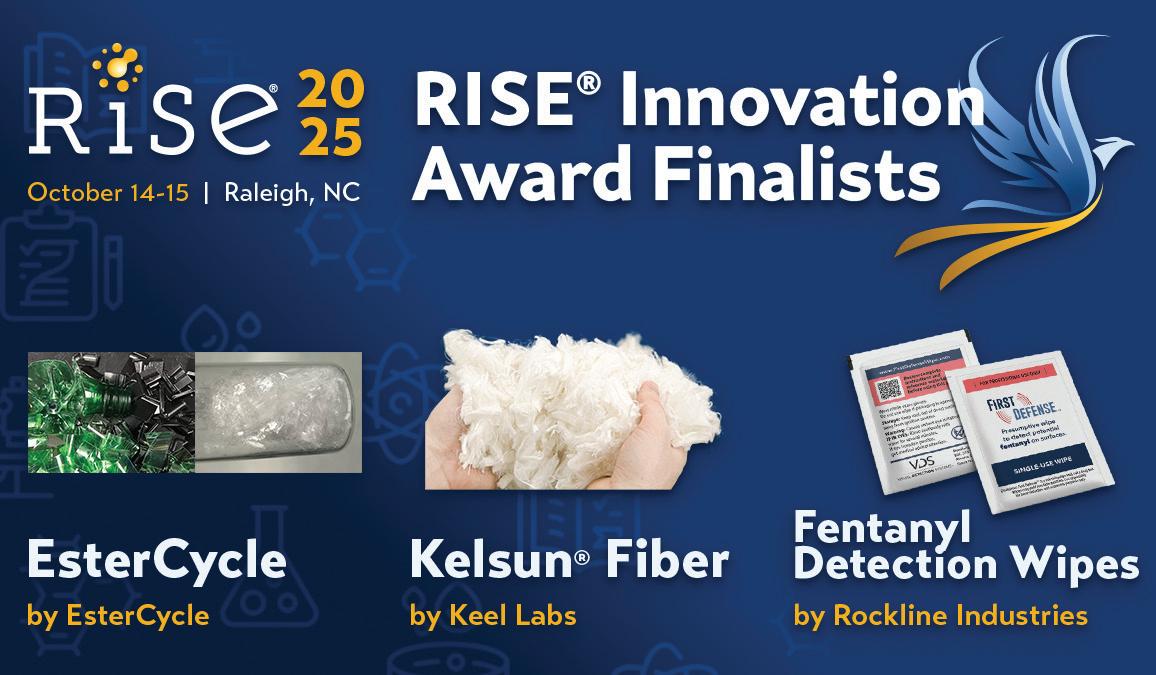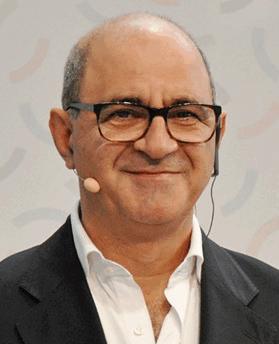
6 minute read
Circularity at the Forefront
By Caryn Smith, PubLISHER & Cheif Content Officer, IFJ
Over 100 presentations in parallel sessions will be presented at the 93rd Textile Institute World Conference (TIWC 2025). The event will take place from October 7 to 10 at the Porto Palácio Hotel and Spa in Porto, Portugal.
A comprehensive and international program, highlighting the close collaboration between researchers on separate continents, showcases the continuing development of technologies and practices for advancing fibre-to-fibre recycling as a means of accelerating a circular textiles economy.
These interlocking themes will define this year’s conference.
Circularity will be one of the most prominent concepts underpinning the program, and researchers from Manchester in the UK, for example, will share their evaluation of end-of-life garments, showing how almost half of those currently sent to waste could be channelled into advanced recycling.
From Chemnitz in Germany, a new knitting technology will be presented that allows higher proportions of recycled content in cotton fabrics while retaining softness and durability.
Most significant at TWIC 2025 will be the attention given to the human dimension of sustainability. In Sri Lanka, small and medium-sized apparel manufacturers will be shown to face critical health and safety risks as climate change brings rising temperatures, air pollution, and extreme weather. A new assessment tool will be introduced, which helps firms build resilience and protect workers.

Furthermore, the Textile Institute, in collaboration with Aquitex, is pleased to announce that António Braz Costa, Citeve, Portugal, (at right) will be delivering a keynote address at the upcoming Textile Institute World Conference (TIWC).
The conference will also explore but not be limited to the following sub-themes:
• Digital Fashion Futures
• Sustainable Fibers and Materials
• Circular Economy in Textiles
• Smart Textiles and Wearable Technology
• Digitalization in Textile Manufacturing and in the Fashion Supply Chain
• Advanced Recycling and Upcycling Technologies
• Sustainable Practices for Textile Processing Research teams working on different continents are arriving at strikingly similar solutions – circularity, digital integration, cleaner chemistry, and human-centered reform are all critical.
Meanwhile, case studies from Bangladesh and Pakistan will explore how local enterprises are already adopting closed-loop systems and circular business innovations, with recycled yarns reaching the supply chains of major global brands.
Taken together, the numerous presentations addressing circularity will demonstrate how waste is shifting from a burden to a new raw material, while also highlighting the infrastructure and policies required to make such systems commercially viable.
Alongside this, the conference will also highlight the revolution now taking place in digitalization.
Far from being a niche domain of design software, digital tools are becoming the backbone of sustainability itself. On the agenda are presentations on blockchain, digital product passports, and RFID systems that trace garments throughout their lifecycle, strengthening consumer trust and helping businesses meet new regulatory requirements.
New methods of digital textile printing and open-source knitting software will also be discussed, offering designers the ability to localise production and work with greater creative agency.
The Sustainable Fibre Alliance will also demonstrate how cashmere herders, traders, and processors in Mongolia are being engaged in a collective effort to reduce rangeland degradation and safeguard livelihoods.
UK fashion educators will further share approaches to preparing the next generation to adopt circular models and ethical consumerism, equipping future designers to strike a balance between profit and responsibility. At the consumer end, new research will reveal misalignments between brand recommendations for garment care and the behavior actually adopted by wearers, showing that communication must evolve.
“These examples will remind delegates that technology and recycling alone cannot deliver sustainability without parallel shifts in culture, education and policy,” says Textile Institute CEO Stephanie Dick. “The global nature of the challenges facing textiles is already widely acknowledged and climate change, waste, toxic chemicals, unsafe labour practices and consumer overconsumption have combined to make fashion and textiles one of the world’s most scrutinised industries. What will emerge from this conference, however, is an unmistakable sense of convergence and solid progress.” www.textileinstitute.org/events/ tiwc
Review the full conference program at https://www.textileinstitute.org/wp-content/uploads/2025/08/Author-List-2.pdf
INDA Announces Finalists for the 2025 RISE® Innovation Award
INDA, the Association of the Nonwoven Fabrics Industry, announced the three finalists for the 2025 RISE® Innovation Award. A highlight of the RISE® (Research, Innovation & Science for Engineered Fabrics) Technology Conference, this award recognizes groundbreaking nonwoven-based innovations with the potential to advance the industry.
The 2025 RISE® Technology Conference will take place October 14-15 at the McKimmon Center, North Carolina State University, Raleigh, NC. Technology scouts, product developers, and business leaders from across the nonwovens value chain will gather to discover the latest research, connect with thought leaders, and see first-hand the technologies competing for the award.
The three finalists will present their groundbreaking technologies to conference participants on Tuesday afternoon, October 14. The winner of the 2025 RISE® Innovation Award will be announced on Wednesday afternoon, October 15.
Meet the 2025 Award Finalists:
EsterCycle by EsterCycle
Hospitals and laboratories generate enormous amounts of PPE nonwoven plastic waste, most of which is incinerated. Polyethylene terephthalate is used extensively in nonwovens, and there is significant interest in using biobased polyesters such as polylactic acid and polyhydroxyalkanoates to reduce the footprint of these essential materials. EsterCycle is a low cost and emissions chemical recycling technology that can handle biohazard contamination and break down mixed polyester nonwovens for circulation back into the supply chain.
Kelsun® Fiber by Keel Labs
Kelsun® Fiber, developed by Keel Labs, is the world’s first highperformance seaweed-based fiber. Plastic-free and tree-free; the combined properties of Kelsun® allow it to outperform all other fibers without shedding harmful microplastics. This break-
Lenzing Introduces “Lenzing Pro” Digital Platform
Global regenerated cellulosic fiber producer Lenzing Group recently launched Lenzing Pro, its one-stop digital platform for the textile and nonwovens supply chains.
Designed as a centralized hub for business users, the platform streamlines certification and branding processes, improves access to technical fiber information, and strengthens collaboration with Lenzing’s partners. This marks a significant step as the industry looks for ways to accelerate the integration of sustainable materials into products more easily.
through material brings extreme softness, high absorptivity, inherent flame resistance and antimicrobial properties, in addition to unmatched biodegradability. Engineered to integrate into existing nonwoven manufacturing, Kelsun® Fiber delivers a revolutionary material that combines performance with sustainability for next-generation consumer and industrial products.
Fentanyl Detection by Rockline Industries
Rockline Industries has developed a revolutionary fentanyl detection wipe that rapidly changes color from orangish to deep red upon contact with miniscule levels of fentanyl, enabling first responders, law enforcement, and others to identify the presence of toxic opioids safely. The wipe contains a novel formula with color indicators and a specific starch bound to viscose fibers, ensuring the reaction occurs on the wipe itself. It has been tested successfully with pharmaceutical and street-grade fentanyl and other dangerous opioids at various U.S. labs and police departments. The single-use sachet offers a convenient presumptive test with broad applications including military, airports, schools, and penitentiaries, with ongoing patent filings and potential for detecting other dangerous opioids. www.riseconf.net
Combining deep expertise in Lenzing’s trusted fibers with tools that enable swift, informed decisions across the global textile supply chain supports the shift toward lowerimpact fiber sourcing.

Lenzing Pro is a strategic evolution of the established and trusted Lenzing E-Branding Service, offering expanded functionality through a streamlined, multilingual and 24/7-accessible experience. Guided by the ethos of “One Platform. Numerous Possibilities”, it plays a vital role in supporting Lenzing’s global network of customers and partners in their decision-making and marketing. In addition to core services such as Lenzing’s Fabric Certification and Brand Licensing, the platform also features a comprehensive fiber product catalog, including detailed specifications, technical properties and recommended applications for each fiber type. www.lenzingpro.com
Inaugural Textiles Recycling Expo USA 2026 Gains Industry Backing
Textiles Recycling Expo which debuted in Europe in June and attracted 126 exhibitors from 67 countries is coming stateside. The North American version, Textiles Recycling Expo USA is gaining industry backing and will be organized by Applied Market Information (AMI) at the Charlotte Convention Center in North Carolina in 2026.
It aims to address the current challenges in the sector by promoting dialogue, innovation, and collaboration for a more circular industry model. The list of exhibitors for the event includes companies such as Syre, Beyond Retro, Bank & Vogue, Valerius, Circ, and Debrand.
Syre, a founding exhibitor will align closely with the U.S. event as it is preparing to open its first plant in North Carolina, which will have the capacity to produce 10,000 metric tons of circular polyester each year. Syre’s involvement is supported by major retailers like H&M, Target, Gap, and Houdini Sportswear.
The event has also attracted sponsors, including American Association of Textile Chemists and Colorists (AATCC) and a dedicated VIP area sponsored by ReJu. The expo has also formed partnerships with associations including Accelerating Circularity, which serves as a structural partner and collaborates with organizers to develop a conference program that addresses critical industry challenges and explores scalable solutions for textile-to-textile recycling.
The Secondary Materials and Recycled Textiles Association (SMART) has joined as a founding partner, contributing its experience and networks to highlight best practices and foster collaboration across the industry.
Other supporters include the Southern Textile Association, Fashion Takes Action, North American Linen Association and the Carolina Recycling Association. events.amiplastics.com/textiles-recyclingexpo-usa/about-AMI










